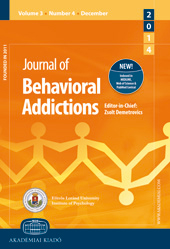Study Addiction – A New Area of Psychological Study: Conceptualization, Assessment, and Preliminary Empirical Findings
Study Addiction – A New Area of Psychological Study: Conceptualization, Assessment, and Preliminary Empirical Findings
Author(s): Paweł Atroszko, Cecilie Schou Andreassen, Mark D. Griffiths, Ståle PallesenSubject(s): Higher Education , Educational Psychology, Individual Psychology, Cognitive Psychology, Behaviorism, Substance abuse and addiction
Published by: Akadémiai Kiadó
Keywords: academic performance; learning engagement; assessment; scale; study addiction; workaholism;
Summary/Abstract: Recent research has suggested that for some individuals, educational studying may become compulsive and excessive and lead to ‘study addiction’. The present study conceptualized and assessed study addiction within the framework of workaholism, defining it as compulsive over-involvement in studying that interferes with functioning in other domains and that is detrimental for individuals and/or their environment. Methods: The Bergen Study Addiction Scale (BStAS) was tested – reflecting seven core addiction symptoms (salience, mood modification, tolerance, withdrawal, conflict, relapse, and problems) – related to studying. The scale was administered via a cross-sectional survey distributed to Norwegian (n = 218) and Polish (n = 993) students with additional questions concerning demographic variables, study-related variables, health, and personality. Results: A one-factor solution had acceptable fit with the data in both samples and the scale demonstrated good reliability. Scores on BStAS converged with scores on learning engagement. Study addiction (BStAS) was significantly related to specific aspects of studying (longer learning time, lower academic performance), personality traits (higher neuroticism and conscientiousness, lower extroversion), and negative health-related factors (impaired general health, decreased quality of life and sleep quality, higher perceived stress). Conclusions: It is concluded that BStAS has good psychometric properties, making it a promising tool in the assessment of study addiction. Study addiction is related in predictable ways to personality and health variables, as predicted from contemporary workaholism theory and research.
Journal: Journal of Behavioral Addictions
- Issue Year: 4/2015
- Issue No: 2
- Page Range: 75-84
- Page Count: 10
- Language: English

